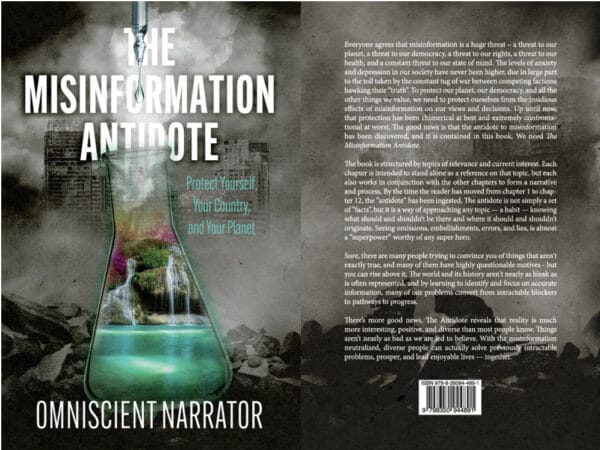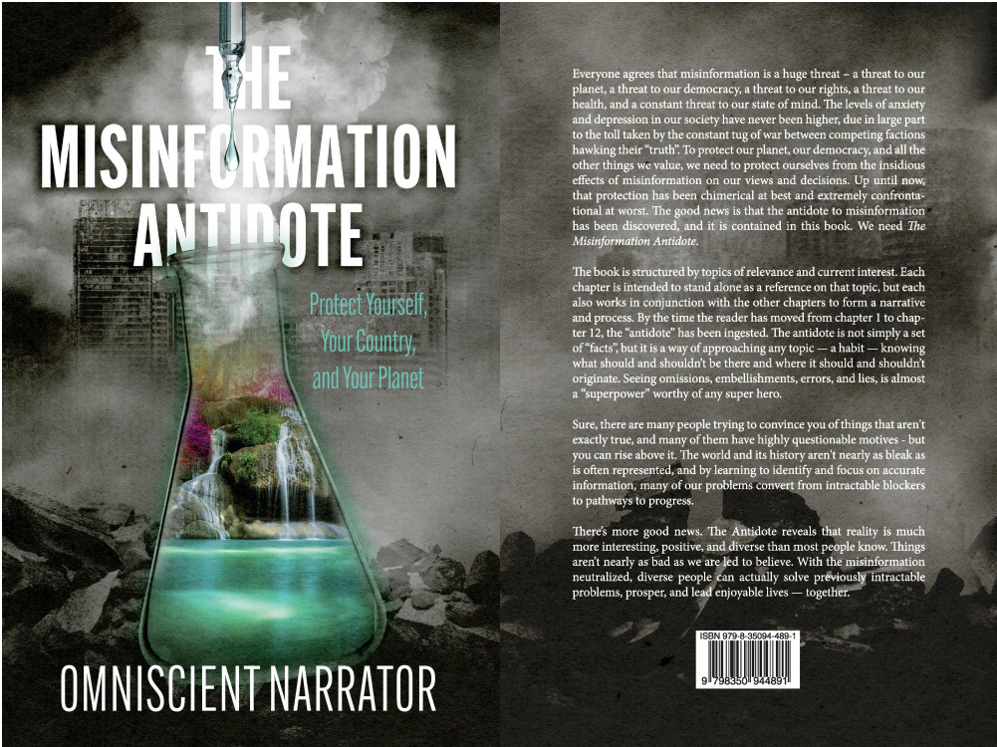
“Unique Book Offers Antidote to 2A Misinformation,” my Firearms News review of The Misinformation Antidote notes. The book’s author, “Omniscient Narrator” (that’s a literary device found in works written as third-person narratives), has written a comprehensive analysis of the ways misinformation allows for public policy to serve the interests of those who require deception to wield power, covering not just Second Amendment matters. It’s an eclectic work that exposes directed fallacies in the mass understanding of topics as diverse as fascism, evolution, scientific knowledge, and more.
I’m doing what I can to bring it to the attention of gun owners and other freedom lovers because I believe we could benefit from being able to recognize when we’re being subjected to bad information, and because those spreading it certainly will never tell us about it. So, in addition to the review, I’ve asked the author to share some of his thoughts with us in an exclusive AmmoLand interview.
DC: Why the pseudonym? What’s the significance of “Omniscient Narrator”?
ON: My “real” job is with a very large publicly traded corporation and my wife works for a large bank, and we need to keep our jobs. Sadly, in today’s environment, it’s almost impossible to point out the realities I do and not be “cancelled” by your employer. I use “Omniscient Narrator” both because that defines objective, accurate, description of reality and because I thought it would make a good brand someday – “ON”, or my handle on X.com @ONomniscient. It could be used for specific topics, like “ON: The New Deal”, or “ON: The Boston Tea Party”.
DC: Do you have any special educational or professional background? How did you come up with the insights you share in the book?
ON: I have a couple of college degrees, including an MDA and some professional certifications. Mostly what qualifies me is 50 years of research into just about everything trying to find out the meaning of life, the universe, and everything (it’s NOT 42). I use primary sources wherever possible and used to live in used bookstores. This way I found things like a book called Men and Issues of ’92, of 1892, covering both Democrat and Republican positions on all the issues as well as bios of all the candidates (a book about 3 inches thick!).
DC: A topic you covered in detail is one exploited to great effect by the political “left,” when it describes it opponents as “fascists.” Could you share a quote or two from Benito Mussolini, so that we can compare what he advocated with the socialist/Democrat platform?
ON: Fascism is the most dangerous and destructive “system” ever developed. It is an actual system – of thought, of economics, of culture. It is NOT simply one dictator making all decisions.
My grandfather served in North Africa fighting Rommel and after landing at Salerno, moved on to Rome. The most dangerous element of Fascism is that the initial positions and arguments sound beneficial and attractive, which people don’t think through to their logical outcomes. Mussolini was a Socialist Party member, and invented Fascism after the Socialist Party kicked him out. As he was walking out the door, Mussolini said “Do not imagine that by tearing up my membership card in the Socialist Party you can forbid my socialist faith or prevent me from continuing to work for the cause of socialism and the revolution”
The first Fascist Party platform published in 1919 included things like a law mandating an 8-hour workday, a heavy inheritance tax, a heavy tax on capital, management of industries by workers unions, and universal suffrage (women right to vote).
Mussolini himself said:
“We are fighting to impose a higher social justice. What does social justice mean? It means guaranteed work, decent homes, and the possibility of evolution and improvement.”
“If classical liberalism spells Individualism, Fascism spells Government”
Two books explaining Fascism, and endorsed by Mussolini, specifically explained:
“The function of private enterprise is assessed from the standpoint of the public interest, and hence an owner or director of a business undertaking is responsible before the State….(Fausto Pitigliani, The Corporative State)
“More Important than the production of wealth is its right distribution, distribution which must benefit in the best possible way all the classes of the nation, hence the nation itself”.
DC: This wasn’t covered in your book, but in your introduction letter to Firearms News, you argued the 1328 Statute of Northampton was critical to understanding – and successfully arguing – for the Second Amendment in court. What was it and why is it important?
ON: It’s been given importance by so-called Constitutional experts and judges themselves, in error. It allegedly shows the “precedent” for “government” regulating the “right” to carry arms (weapons) and was addressed at length in the arguments in the Bruen case decided June 2022. New York State Rifle & Pistol Association Inc. v. Bruen concerned the states’ “restrictions” on lawful citizens carrying firearms. It is cited and discussed as part of the false and deceitful allegation that the meaning of the 2nd amendment is not “clear” and that in “trying to understand” what the drafters and ratifiers of the Constitution “thought” it meant, it is appropriate to look to English law because that is what they used prior to the Revolution.
The first problem with this argument is that in 1328, English citizens had NO RIGHTS, except those that the King GAVE them. So, a prohibition of carrying weapons (firearms had not been invented then) in public areas and specifically in front of the King’s court and officers, was just an instruction that allowed the King to forcibly deter mobs who could attack him. The people had no right to carry weapons because the King hadn’t given them that right. The entire model of English law, supposedly beginning with Magna Carta in 1215, is that people get their rights from their rulers which is diametrically opposite of the American model which radically and uniquely is based on the model that people have all rights which come from their “Creator”, and they keep all rights one can conceive except the ones they explicitly say Government can access.
The second problem is that even if this English law could be used to explain the founders’ understanding of “arms” and “carrying arms”, the constitution was drafted in 1787, some 450 years after the Statute of Northampton. It is being invoked to allegedly help us understand words that were written only 237 years ago – which is completely illogical. If we can’t understand what someone wrote 237 years ago, how could the framers understand words written 450 years before them well enough to inform their understanding?
The English law arguments are used to prop up the fallacious position that the meaning of the Second Amendment is unclear, and no legitimate judge should indulge in such a discussion. It is irrelevant and that’s what it should be labelled.
DC: You make a point of noting the Constitution places control of the Militia under the national government and not the states. What’s your basis for that, and what happens when the people of a state decide the feds are tyrannizing them?
ON: From the beginning of the colonization of this continent, the defense of the colonies was provided by the colonists themselves, called the Militia. It consisted of every abled bodied man who were required to furnish their own guns and ammunition. So basically, every citizen served. This is contrasted with a professional army, which is composed of people who do nothing else but be soldiers – train, shoot, drill, etc. The training obviously makes them much more effective than the Militia, but also more costly – and dangerous to the citizens if they are used in the wrong way, like propping up a tyrannical government.
Everyone realized after the revolution Militia was not sufficient, and the debate about forming a “well regulated militia” began. Well regulated means they carry the same types of guns, have the same type of training, spend time training, etc. They are a subset of the traditional militia. It was correctly decided that if the well regulated militia was necessary to protect the whole country, that it should logically be under control of the federal government, and Article 1 section 8 gives Congress the power to arm and train the Militia.
Now there’s a problem. The new Constitution gave the Feds an army, navy, and the Militia, so the individual states and the people in them are defenseless against the Federal power. When the Militia was taken from the states, and the power to arm them given to Congress, the People needed a power that would enable them to control this Federal government – thus the 2nd Amendment.
DC: You also indicated via correspondence that Clarence Thomas, viewed by many as the best mind on the court when it comes to the Second Amendment, has reached some conclusions that will end up working against us. Why, and what’s your solution?
ON: My concerns with the current court, including Clarence Thomas, is that they effectively are using the “the 2nd amendment is unclear” argument, and have directed lower courts to use the “historical” record as “evidence” of what the framers and the states were legislating in 1791 so what the meaning is. The first problem, apart from the fact that the 2nd Amendment is not in any way unclear, is that the first stop in understanding what the framers and ratifiers thought the 2nd Amendment means should be what they actually said it means in the debates and in the newspapers. There is unanimous interpretation in all the debates and publications by everyone, so no one should have to resort to English laws of 1328 and what kinds of laws were enacted in certain states around 1792. By indulging in this type of discussion, Justice Thomas legitimizes it and clears the way for judges in lower courts to rule in bizarre and disingenuous ways, such as ruling that AR-15’s are “military” weapons not covered by the 2nd Amendment.
What must happen is that the Supreme Court needs to reengineer their interpretation of the 2nd Amendment to be correct – that it HIGHLIGHTS the right of the people to keep and bear any and all types of arms primarily so that they have the realistic ability to control the Federal government if it becomes tyrannical. The highlight of this right does not mean that the people do not have the right to keep guns for self-defense or hunting – two uses that the framers and ratifiers explicitly stated didn’t need to be highlighted because the thought the government could regulate them was ABSURD!
We could go on, but that’s enough to consider for now, and is sure to result in discussion from those who haven’t looked beyond Bruen. Hopefully, readers will be intrigued enough to do some further explanation, and for that, two resources come readily to mind:
First, read the Firearms News review.
Then obtain a copy of The Misinformation Antidote: Protect Yourself, Your Country, and Your Planet, and read it. It can be purchased as a paperback, E-book and audiobook at BookBaby.com.
About David Codrea:
David Codrea is the winner of multiple journalist awards for investigating/defending the RKBA and a long-time gun owner rights advocate who defiantly challenges the folly of citizen disarmament. He blogs at “The War on Guns: Notes from the Resistance,” is a regularly featured contributor to Firearms News, and posts on Twitter: @dcodrea and Facebook.







Re: “they effectively are using the “the 2nd amendment is unclear” argument” The purpose of the Amendments, which includes the Second, is very “clearly” stated in the Preamble to the Bill of rights where it says “The convention of a number of states having at the time of their adopting of the Constitution, expressed a desire, in order to prevent misconstruction or abuse, of its powers that further declaratory and restrictive clauses should be added”. Note that when the Second Amendment was written, every weapon was a weapon of war, there were no restrictions on the private ownership of weapons… Read more »
I have a great compromise, they can bitch I will keep my guns and ammo they step in my space they can eat dirt,and grow worms
Well thought discussion. Perhaps this will percolate out/up.
We are asked to believe, “When the Militia was taken from the states, and the power to arm them given to Congress, the People needed a power that would enable them to control this Federal government – thus the 2nd Amendment.” Hardly. The militia was never “taken from the states,” and most states have laws expressly referring to it. State militia predate even the Continental Congress. Even the Militia Act, from 1792 on, defines “the militia” as common citizens. The Miller decision expressly states that militia, when called to service, should come “bearing arms provided by themselves, and of a… Read more »
all us over 45 that will defend our rights and not give in to just one more thing….
swmft … They don’t realize that we have nothing to lose except our freedom .
This is addressed at length in the book with numerous quotes (shameless plug, sorry) but article One section 8 gives Congress the power “for organizing, arming, and disciplining the militia”. That’s how “the militia” turns into “well-regulated militia”. If Congress is doing that, the states obviously can’t, or they would both be doing the same things. Certainly the People are not “arming the militia” again, because the Congress is doing it. Congress arming the militia is opposite the traditional approach of individual citizens bring their own arms, which is what the Miller decision references – what was happening historically and… Read more »
The author’s real name appears to be at the bottom of the BookBaby page under the About The Author section. If he really wants to be an anonymous omniscient narrator he might want to fix that.
ON seems to be saying what I have espoused for years: the prefatory clause, “A well regulated militia being necessary to the security of a free state,” merely identifies the potential threat to liberty and a constitutional republic. “[T]he right of the people to keep and bear arms shall not be infringed,” is meant to counter that threat and in Scalia’s words is an “unqualified command” meaning the right is unlimited. The founders would look upon Tsingtao Tim like he was a General Gage (in his official capacity of Royal Governor) and expected his MN national guard and police to… Read more »
they would hang him as an example
Thomas has state the proper legal basis for the Second Amendment is the 14th amendment which states in part “No State shall make or enforce any law which shall abridge the privileges or immunities of citizens of the United States.” That is, legally, the Second amendment conferred an immunity to having their right to keep and bear arms infringed. Hence it must bind the states and the federal government.